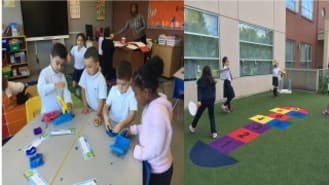
How can we ritualise the gratitude and the gratuitousness with the children in order to amplify their happiness? Comment ritualiser le merci et les actes de gratuité avec les enfants afin d’amplifier leur bonheur ?
Le jour de la rentrée scolaire, parents et élèves furent accueillis à bras ouverts et avec des paroles chaleureuses de bienvenue à la « Madame Lisette », dans le hall de l’Académie Providence harmonieusement décoré par des affiches qui reflètent le thème majeur de l’année «Gratitude et Gratuité ».
Comment apprendre à être reconnaissants, à dire merci et à poser des gestes de bonté et de gratuité dans la vie ? Comment apprendre à apprendre sans objectif autre que grandir et faire plaisir ? As proven by the specialists of positive psychology, people who express regular gratitude are happier, more energetic, more optimistic, more helpful and more empathetic.
Therefore, the students will learn to express their gratitude, to say thank you to God for all the little joys of life, and to be grateful to their parents as well as their teachers. The teachers will encourage them to be aware of the gratuitousness which can be focused on good. They will help them to be aware of the gratuitousness of God’s love and to make free gestures that are expressed in service and in charitable acts. The will help them to give without a reason but only for the purpose of pleasing. They will awaken them to spread the good around them.
Quelle pédagogie que de ritualiser le merci et les gestes gratuits de bonté, d’enthousiasme et de générosité! Merci aux professeurs pour leur souci pédagogique, à Mlle Mirna et à Madame Mireille en particulier pour leur contribution à la rédaction de ce projet!